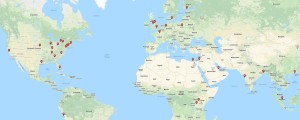The Atlas of Blood Cancer Genomes Project: A comprehensive molecular characterization of leukemias and lymphomas
Introduction and Guiding Philosophy
Blood cancers are collectively common cancers. These cancers are strikingly heterogeneous at the genomic level and have been classified and re-classified extensively into over 100 different leukemias and lymphomas.
Our group at Duke has extensive expertise in the generation and analysis of genomic data underlying cancers. In this project, we seek to build upon our advances, capabilities and economies of scale in genomics to comprehensively elucidate the molecular basis of all leukemias and lymphomas.
This project aims to address several systemic problems in current approaches to genomics. First, most genomics projects are typically undertaken in an ad-hoc fashion with relatively little work devoted to follow up studies. As a result, many diseases or patient groups (e.g. African Americans) remain understudied. Second, projects undertaken at different institutions often use very different methodologies for sample processing, sequencing and analysis, creating daunting challenges for comparisons across studies. Third, the credit for genomics projects flows disproportionately to the few laboratories and groups that are able to maintain the infrastructure and trained personnel needed to perform these studies. This has resulted in a paucity of trained pathologists and clinicians who have the exposure and publication record needed to successfully perform critical follow up studies, collaborate broadly, and accelerate the clinical adoption of next generation sequencing.
Atlas of Blood Cancer Genomes Project
To address these central problems in blood cancers, we founded the Atlas of Blood Cancer Genomes (ABC-G) Consortium, comprised of over two dozen institutions around the world. The ABC-G Consortium has enrolled over 10,000 patients from every type of leukemia and lymphoma including rare types defined by the World Health Organization (WHO). These cases will be comprehensively profiled by our group to define their molecular characteristics.
The central questions we seek to address are:
- What are the genomic foundations of common leukemias and lymphomas, as well as important subgroups within these defined cancers (e.g. African Americans with diffuse large B cell lymphoma)?
- What can we learn from cross-disease comparisons to define new treatments and models across different leukemias and lymphomas?
- How do we use these data to better diagnose and treat leukemias and lymphomas.
In addition to data generation and analysis, we incorporate a significant training component with a yearly conference (genomic frontiers conference) and training on our bioinformatics platforms to understand genomic analyses in a hands-on fashion.
Timeline and participants
Data generation for the project is under way. We anticipate the first publications from the project to begin in late 2021 and continue through the year 2022.
The consortium comprises investigators from the following institutions (The list is still growing. Contact us if you want to participate):
City of Hope
Cleveland Clinic
Columbia University Medical Center
Cornell University
Duke University
Emory University
Hadassah University
HMC-Qatar
Imperial college
Indiana University
James Univ Hospital
Massachusetts General Hospital
MD Anderson Cancer Center
National Cancer Centre Singapore / Singapore General Hospital
Northwestern University
Rutgers University
Stanford University
Tufts University
University of Copenhagen
University of Helsinki
University of Hong Kong
University of Liverpool
University of Miami
University of Muenster
University of Nebraska
University of North Carolina
University of Pennsylvania
University of Rochester
University of Toronto
Vanderbilt University
Yale University

